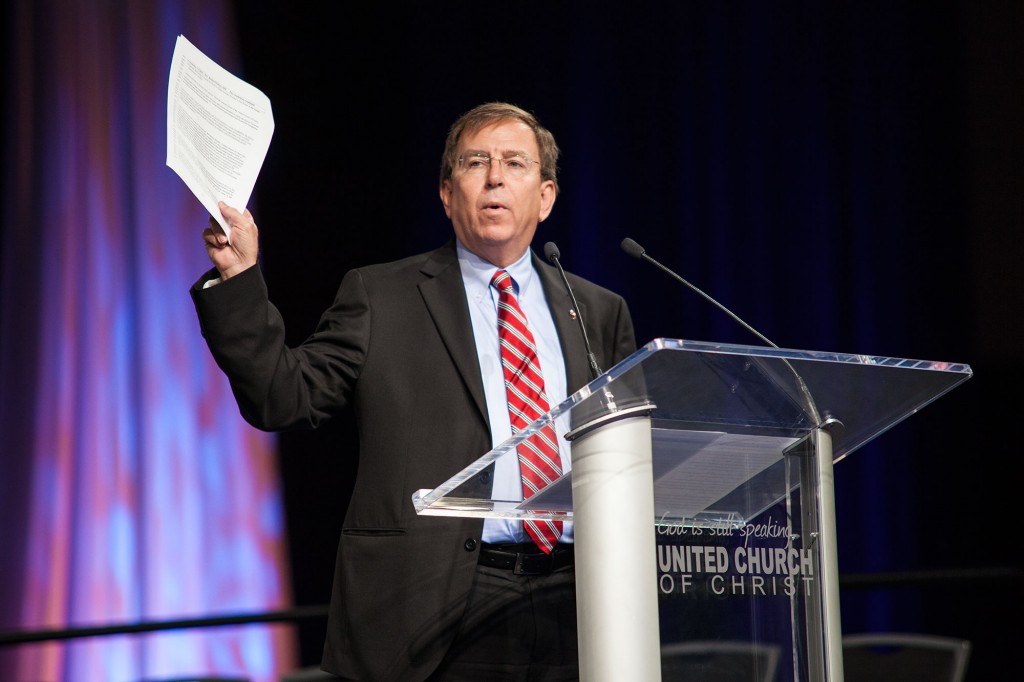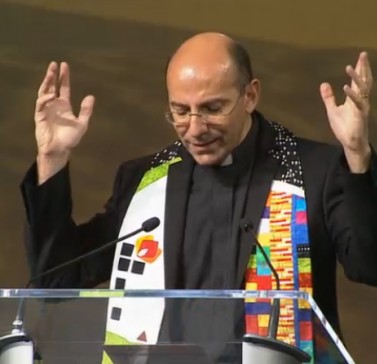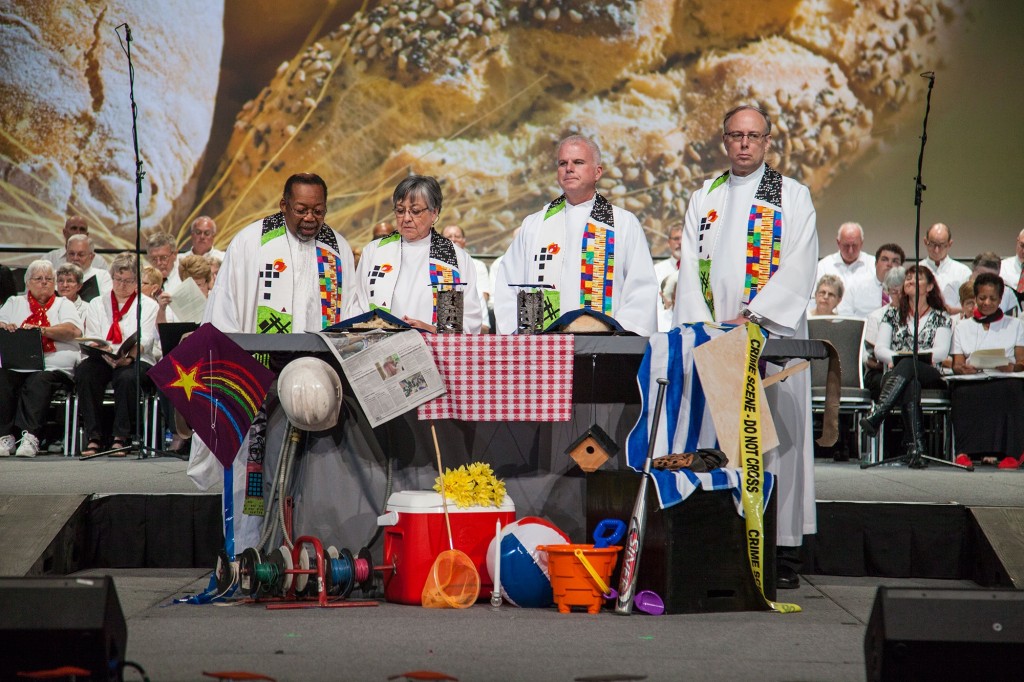The boycott-Israel movement is built on the principle of rejection of a peaceful solution to the conflict. So why would a big church want any part of it?
In late June, the United Church of Christ held its 30th General Synod in Cleveland. At the conclusion of a small news conference during the event, UCC Board Chair Rev. Dr. Bernard Wilson remarked, “One should never underestimate the power of words.” This sentiment was particularly significant on an afternoon that saw the UCC vote to boycott and divest from companies that allegedly profit from the Israeli occupation of Palestinian territories.
The UCC’s divestment resolution, titled “Call for the United Church of Christ to Take Actions Toward a Just Peace in the Israeli-Palestinian Conflict,” exemplified Wilson’s advice. It expressed hopes for an end to the Israeli-Palestinian conflict, underlined the responsibility of the church to promote regional peace, and wrote movingly of Palestinian courage, suffering, and despair. Yet while these words formed the backbone of the resolution, it was the omission of others that ultimately secured its overwhelming victory at the General Synod: The UCC’s call for a “Just Peace” completely excluded the Israeli point of view.
In fact, the resolution and the discussion leading up to it were overwhelmingly partisan and hostile toward Israel. In this, they reflected the efforts of various anti-Israel groups working to demonize, isolate, and ultimately destroy the Jewish state through political and economic warfare. These networks are particularly influential in mainline Protestant denominations like the UCC, and so the pro-Israel community must begin to proactively challenge these groups, and help Christian allies fight them, before they gain more momentum in American churches and beyond.
During the time that the resolution was debated and adopted, several events took place that explicitly underlined its bias. In the weeks preceding the vote, Israel eased travel restrictions in honor of the Muslim holy month of Ramadan. Taking advantage of this, Palestinians carried out multiple stabbing, stoning, and shooting attacks against Israelis, some of them fatal, and fired rockets at the country’s southern communities. Yet the UCC resolution did not contain a single mention, much less condemnation, of any act of Palestinian terrorism. Instead, it focused exclusively on the occupation of the Palestinian territories as the major cause of the conflict, and included a litany of alleged Israeli offenses that culminated in a series of demands and one-sided punishments. Most notable among these was the call for divestment, which the resolution described as a way for the UCC to “add its weight” to the Boycott, Divestment, and Sanctions (BDS) movement.
This open support for the BDS movement showed another, darker side of the resolution’s bias: It made no mention of the movement’s ultimate goal, which various BDS leaders have repeatedly acknowledged to be the destruction of Israel as a Jewish state and its replacement with an Arab state. Indeed, BDS co-founder Omar Barghouti once colorfully said, “Zionism is intent on killing itself. I, for one, support euthanasia.”
The UCC overwhelmingly endorsed this exclusionary narrative, adopting the resolution with an 80 percent majority. While a second General Synod resolution that sought to label Israel’s policies toward the Palestinians as “apartheid” failed to pass, the victory was superficial after the success of a measure containing such a rich selection of other libels.

Rev. Richard Edens, chair of the UCC’s committee that proposed its divestment resolution, speaks at the UCC General Synod. Photo: United Church of Christ / flickr
BDS efforts are also being pursued at other churches. A few days after the UCC vote, two other mainline churches voted on similar resolutions. The Episcopal Church rejected the proposal, while the Mennonite Church USA decided to delay a vote until 2017. Though both decisions were welcomed by opponents of divestment, they did not constitute a decisive victory. Indeed, anti-Israel groups within these churches pledged to continue their efforts. Subsequent to the Episcopal Church’s vote, Donna Hicks, a representative of Episcopal Peace Fellowship Palestine Israel Network, said, “We’re optimistic that today’s vote is just another step in our own process to ensure that we are not profiting from the occupation, and that divestment will pass at a General Convention in the near future.”
Clearly, the UCC vote on divestment was not an isolated phenomenon. Anti-Israel campaigns in mainline Protestant churches have been ongoing for some time. In 2014, the Presbyterian Church (USA) passed a resolution to divest from three companies due to their operations in Israel and the Palestinian territories. Days earlier, the United Methodist Church announced it was selling its holdings in G4S—an international security company with contracts across the world—due to its ties to Israel. A New York Times article covering the Methodist divestment noted, “Members of both churches have been debating divestment for years at their conventions, the result of a larger campaign by activists who see divestment as a strategy to pressure Israel to stop building settlements and to take steps toward a peaceful resolution with the Palestinians.”
A similar network of activists spearheaded an extensive pro-divestment campaign in the UCC before the General Synod. The United Church of Christ Palestine/Israel Network (UCC-PIN), a group established to “educate and motivate” the UCC on the Israeli-Palestinian conflict, had been “presenting workshops and study sessions…in local churches, associations, and conferences” since 2012. In a recent report aimed at exposing the actors driving the UCC divestment resolution, the watchdog group NGO Monitor wrote,
Leading this intense campaign against Israel within the denomination is a number of highly politicized UCC sub-groups including Global Ministries and the Palestine Israel Network (UCC PIN). These groups hold a virtual monopoly on the parameters of the discussion about Israeli-Palestinian issues within the UCC, and providing church members with selective and biased information.
That information included a series of articles and graphics on the group’s social media accounts, as well as a selection of instructional resources featured on their webpage. Among these was a short film titled “ZIONISTS WON’T LET YOU SEE THIS ON YOUR TV,” an extensive reading list of anti-Zionist writings by figures such as Ilan Pappé and Noam Chomsky, and a gallery of images chronicling alleged Israeli crimes.
Perhaps most disturbing among the images used was a photo of a weeping man holding a small, shrouded body. It was captioned, “A father from Gaza grieves the loss of his child.” The photo was of Jihad Masharawi, a BBC Arabic journalist and Gaza resident whose 11-month-old child was killed during Operation Cast Lead in 2012. Palestinian sources immediately blamed the deaths of the infant and two of his relatives on an Israeli airstrike. The photo was widely circulated across social media and international news reports as a poignant representation of Palestinian grievances. Four months later, however, a UN report determined that Masharawi’s son was likely killed by a Palestinian rocket that fell short of striking its Israeli target. Ironically, the picture is the only one depicting a victim of Hamas terrorism on UCC-PIN’s website.
Beyond the galleries and articles, the main educational resource promoted by UCC-PIN is the Kairos Palestine document. This declaration was written in 2009 by a collection of Palestinian Christian leaders and was pointedly named after the 1985 Kairos statement issued by South African pastors, which critiqued the Christian world’s response to apartheid in South Africa. Kairos Palestine strongly supports the BDS movement, and its language serves as a model for the divestment resolutions that answer its call to action. UCC-PIN’s resolution described study of the document as an act of “educational empowerment.” In it, Israelis are told to “liberate themselves from the evil that is in them,” and the international community is rebuked for its refusal “to deal positively with the will of the Palestinian people expressed in the outcome of democratic and legal elections in 2006.” The will of the Palestinian people as expressed in 2006 was the election of Hamas, the same Islamist terrorist organization that has explicitly rejected the two-state solution and, in its last war with Israel, launched rockets at Israeli civilians from a Greek Orthodox church. Kairos Palestine makes no effort to reconcile this “outcome” with its claims that Palestinians do not support terrorism.
Kairos Palestine also teaches that “if there were no occupation, there would be no resistance,” seemingly forgetting the existence of the over 1,500 men, women, and children who died at the hands of Palestinian terrorists before there was an occupation to blame. Like all of UCC-PIN’s materials, Kairos Palestine aims to reframe the conflict as a binary narrative of the violent aggressor versus the innocent victim, and seems to have no qualms about whitewashing terrorism and other crimes committed by Palestinians in the name of “educational empowerment.”
In an effort to further advance these teachings, UCC leaders went on a witness trip to the Middle East with Global Ministries—the joint international ministry of the UCC and Disciples of Christ—two months before the General Synod. In a series of blog posts, the delegation reflected on their pilgrimage to Jordan, the Palestinian territories, Israel, Egypt, and Lebanon. Between visits to Palestinian refugee camps in Beirut and the BDS headquarters in Ramallah, the pilgrims had ample opportunity to study and reflect on the Palestinian narrative to which they were exposed.
But during a trip ostensibly crafted to help a delegation of American Christians witness and experience life in the Middle East, Israelis were remarkably scarce. For the most part, they appeared as activists from the Left-wing NGO B’Tselem or armed border guards, effectively relegated to a supporting cast in a drama that portrayed their entire nation as villainous. While participants lauded the multiple opportunities they had to talk with Muslims and Christians throughout the trip, Israeli Jews seemed to remain distant specters, described solely in relation to alleged crimes against Palestinians. The only time a member of the delegation acknowledged that the conflict took a toll on Israelis, it was to write, “Clearly, Palestinians bear the brunt of the suffering, but Israelis are also negatively impacted. The occupation is a cancer on the soul of Israel which seeks ever elusive security through violence and repression.”
Soon after the delegates returned home, Rev. Dr. Mitri Raheb—a Palestinian Lutheran pastor from Bethlehem and co-author of the Kairos Palestine document—arrived in Cleveland to preach at the General Synod. Raheb had previously gained attention in 2010 when he claimed at Christ at the Checkpoint, an Evangelical anti-Zionist conference in Bethlehem, that Israeli Prime Minister Benjamin Netanyahu is a descendant of the Khazars, an Eastern European tribe that converted to Judaism in the Middle Ages, and therefore has no historical roots in the region. Raheb’s claim, which has been repeatedly debunked, is the product of a virulent strain of Palestinian supersessionism that seeks to divorce Jews from their own ancestral history in an effort to undermine Jewish claims to the Holy Land. Raheb shared the same theology in his remarks the evening before the General Synod vote, mentioning Israelis only insofar as they could be portrayed as aggressors in the conflict, speaking of a Bible that was “made in Palestine” and consistently replacing references to Biblical Israelites or Jews with references to Palestinians.

Rev. Mitri Raheb spoke in favor of the divestment resolution at the United Church of Christ General Synod. Photo: United Church of Christ
Notably, UCC-PIN’s extensive network of partner groups, from Sabeel—a Palestinian Christian theological center intimately involved in promoting Palestinian supercessionism and supporting divestment efforts in churches around the world—to the far-Left group Jewish Voice for Peace (JVP), remained engaged with UCC throughout the divestment effort, giving the resolution the impression of broad external support.
Indeed, JVP sent an entire delegation to the Synod, and their support was mentioned frequently and prominently by UCC-PIN, which claimed that “Boycott and divestment is supported by many Jewish organizations.” But the idea that BDS enjoys a significant amount of American Jewish support is blatantly false. In fact, supporting BDS places the Church in diametric opposition to the main bodies of Reform, Orthodox, and Conservative Judaism, all of which have condemned the movement. Moreover, BDS is antithetical to the position of the majority of American Jews, who wish to maintain current levels of support for Israel. Their rabbinical leaders feel the same way, with over 1,700 signing an open letter rejecting the BDS movement.
The reasons for the success of the UCC divestment resolution are fairly clear. Its supporters are well-organized and highly active. They skillfully use biased and sometimes false information to make their case. They have strong and prominent external allies. And, perhaps most importantly, they are mostly unchallenged by pro-Israel groups. This, in particular, must change.
American churches are home to some of Israel’s best friends. A 2014 Pew Research survey found significant support for the Jewish state across various Christian denominations, which helps explain why the group Christians United for Israel is the country’s largest pro-Israel organization. But anti-Israel activists are working hard to change this reality, and they will certainly continue their efforts to pass resolutions condemning the Jewish state and advocating BDS in mainline churches. If left unchallenged, they will only become stronger over time.
As a result, the pro-Israel community has a responsibility to take action on this issue. Pressure groups have proven to be an effective way for grassroots activists to create momentum around an idea and introduce it to a wider body, and Christian partners can be similarly empowered through the establishment of pro-Israel networks in churches nationwide. These networks can create a space for dissenting viewpoints and challenge the churches’ dependence on partisan, pro-BDS groups for information about the Israeli-Palestinian conflict. By providing accessible, fact-based educational resources needed to prevent the spread of anti-Israel propaganda, while facilitating missions to the Middle East that humanize Israelis and Palestinians alike, these groups would be able to build a base of pro-Israel activists and allies that can be rallied in support of or opposition to various initiatives at a grassroots level. There is already evidence that such an approach can work. When the Episcopal Church’s General Convention voted on a divestment resolution, the American Jewish Committee was present as an observer group; the resolution was soundly defeated.
With the presence of such pro-Israel networks, groups like UCC-PIN will no longer be able to generate the facade of broad anti-Israel sentiment or peddle their harmful fabrications unchallenged. The hateful political agenda they and other BDS activists seek to preach in churches across the nation will be exposed to the benefit of legitimately peaceful voices, Israeli and Palestinian alike.
![]()
Banner Photo: United Church of Christ / flickr





